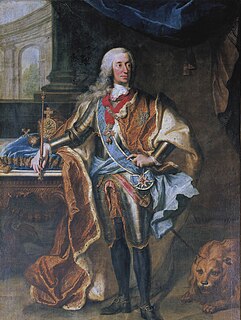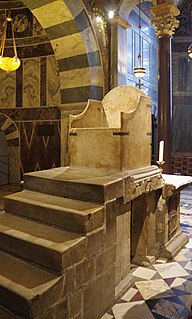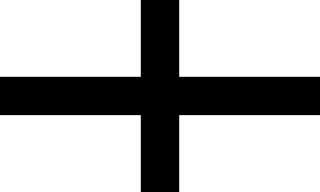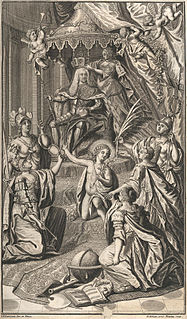Related Research Articles

The Holy Roman Empire was a multi-ethnic complex of territories in Western and Central Europe that developed during the Early Middle Ages and continued until its dissolution in 1806 during the Napoleonic Wars. The largest territory of the empire after 962 was the Kingdom of Germany, though it also included the neighboring Kingdom of Bohemia and Kingdom of Italy, plus numerous other territories, and soon after the Kingdom of Burgundy was added. However, while by the end of the 15th century the Empire was still in theory composed of three major blocks – Italy, Germany, and Burgundy – in practice only the Kingdom of Germany remained, with the Burgundian territories lost to France and the Italian territories, ignored in the Imperial Reform, although formally part of the Empire, were splintered into numerous de facto independent territorial entities. The external borders of the Empire did not change noticeably from the Peace of Westphalia – which acknowledged the exclusion of Switzerland and the Northern Netherlands, and the French protectorate over Alsace – to the dissolution of the Empire. By then, it largely contained only German-speaking territories, plus the Kingdom of Bohemia. At the conclusion of the Napoleonic Wars in 1815, most of the Holy Roman Empire was included in the German Confederation.

Charles VII was the Prince-elector of Bavaria from 1726 and Holy Roman Emperor from 24 January 1742 until his death in 1745. Charles was a member of the House of Wittelsbach, thus his reign as Holy Roman Emperor marked the end of three centuries of uninterrupted Habsburg imperial rule. He was, however, related to the Habsburgs both by blood and by marriage. After the death of emperor Charles VI in 1740 he claimed the Archduchy of Austria due to his marriage to Maria Amalia of Austria, the niece of Charles VI, and was from 1741 to 1743 as Charles III briefly King of Bohemia. In 1742 he was elected emperor of the Holy Roman Empire as Charles VII and ruled until his death three years later.

King of the Romans was the title used by the German king following his election by the princes from the reign of Emperor Henry II (1014–1024) onward. The title predominantly amounted to being the emperor of the Holy Roman Empire and was dependent upon coronation by the pope.

Frankfurt Cathedral, officially Imperial Cathedral of Saint Bartholomew is a Roman Catholic Gothic church located in the centre of Frankfurt am Main, Germany. It is dedicated to Saint Bartholomew.

Daniel Brendel of Homburg was the Archbishop-Elector of Mainz from 1555 to 1582.

The Free Imperial City of Aachen, also known in English by its French name of Aix-la-Chapelle and today known sinply as Aachen, was a Free Imperial City and spa of the Holy Roman Empire west of Cologne and southeast of the Low Countries, in the Lower Rhenish–Westphalian Circle. The pilgrimages, the Coronation of the Holy Roman Emperor, flourishing industries and the privileges conferred by various emperors made it one of the most prosperous market towns of the Holy Roman Empire.
The imperial election of 1376 was an imperial election held to select the emperor of the Holy Roman Empire. It took place in Frankfurt on June 10.
The imperial election of May 22, 1400 was an imperial election held to select the emperor of the Holy Roman Empire. It took place in Frankfurt.
The imperial election of 1438 was an imperial election held to select the emperor of the Holy Roman Empire. It took place in Frankfurt on March 18.
The imperial election of 1440 was an imperial election held to select the emperor of the Holy Roman Empire. It took place in Frankfurt on February 2.
The imperial election of 1486 was an imperial election held to select the emperor of the Holy Roman Empire. It took place in Frankfurt on February 16.
The imperial election of 1531 was an imperial election held to select the emperor of the Holy Roman Empire. It took place in Cologne on January 5.

The imperial election of 1612 was an imperial election held to select the emperor of the Holy Roman Empire. It took place in Frankfurt on June 13.
The imperial election of 1619 was an imperial election held to select the emperor of the Holy Roman Empire. It took place in Frankfurt on August 28.
The imperial election of 1658 was an imperial election held to select the emperor of the Holy Roman Empire. It took place in Frankfurt on July 18.

The imperial election of 1742 was an imperial election held to select the emperor of the Holy Roman Empire. It took place in Frankfurt on January 24. The result was the election of Charles Albert of Bavaria, the first non-Habsburg emperor in hundreds of years.
The imperial election of 1745 was an imperial election held to select the emperor of the Holy Roman Empire. It took place in Frankfurt on September 13.
The imperial election of 1764 was an imperial election held to select the emperor of the Holy Roman Empire. It took place in Frankfurt on March 27.

The imperial election of 1273 was an imperial election held to select the emperor of the Holy Roman Empire. It took place in Frankfurt on October 1.

The imperial election of October 19, 1314 was an imperial election held to select the emperor of the Holy Roman Empire. It took place in Sachsenhausen, near Frankfurt.
References
- ↑ Nagel Travel Guide Series: Germany. McGraw-Hill. 1965.
- ↑ Karl Baedeker (Firm) (1960). Frankfurt and the Taunus: handbook for travellers. K. Baedeker.
- ↑ Colin Morris (1991). The Papal Monarchy: The Western Church from 1050 to 1250. Clarendon Press. pp. 424–. ISBN 978-0-19-826925-0.
| This Holy Roman Empire–related article is a stub. You can help Wikipedia by expanding it. |